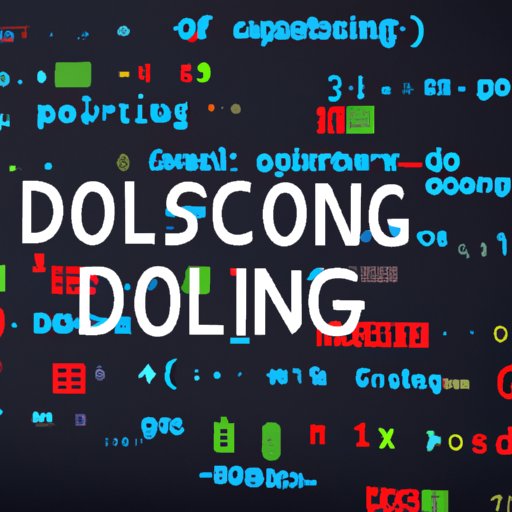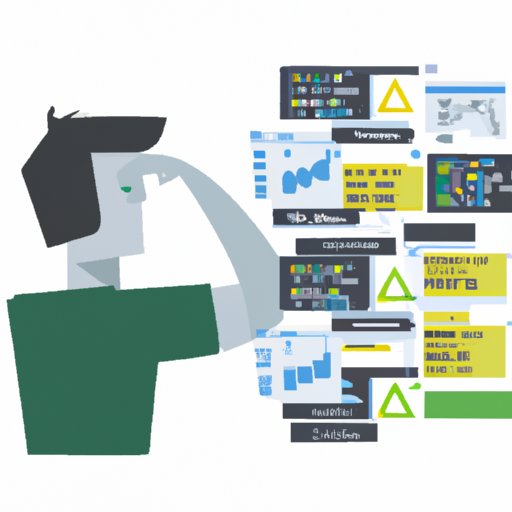Introduction
Data science coding involves the use of programming languages, algorithms, and tools to gain insights from data. With the ever-increasing amount of data available in today’s digital world, data science coding has become a critical skill for businesses, researchers, and other professionals who need to make sense of vast amounts of data. This article will explore what data science coding is, why learning about it is important, what types of languages and tools are used, understanding data science algorithms, exploring the benefits of data science coding, the challenges of data science coding, best practices for developing data science programs, and the future of data science coding.
What is Data Science Coding?
Data science coding is the application of programming techniques to extract insights from large datasets. According to data scientist Andrew Ng, “data science is an interdisciplinary field that combines computer science, mathematics, and statistics to analyze complex data.” Data science coding involves the use of algorithms, languages, and tools to uncover patterns, trends, and relationships hidden within data. By applying data science coding techniques, businesses can gain valuable insights and make more informed decisions.
Why Learn About Data Science Coding?
Data science coding is a valuable skill in today’s digital world. As companies generate increasingly large amounts of data, they need professionals who can make sense of this data and extract meaningful insights. According to a study by McKinsey Global Institute, “by 2018, the United States alone could face a shortage of 140,000 to 190,000 people with deep analytical skills as well as 1.5 million managers and analysts with the know-how to use the analysis of big data to make effective decisions.” Learning data science coding can give professionals an edge in the job market and help them stay ahead of the competition.
Types of Data Science Languages and Tools
There are a variety of languages and tools used in data science coding. Popular data science languages include Python, R, Java, and SQL. Python is a versatile language that is popular among data scientists due to its simple syntax, extensive library support, and support for object-oriented programming. R is another popular language due to its ability to handle large datasets and its extensive library of statistical functions. Java is a powerful language that is often used for data-intensive applications. SQL is a query language designed for managing databases and retrieving information from them.
Common data science tools include Apache Hadoop, Apache Spark, Tableau, QlikView, and SAS. Apache Hadoop is an open source software framework for distributed storage and processing of large datasets. Apache Spark is an open source cluster computing framework designed for large-scale data processing. Tableau is a data visualization tool that can help users create interactive charts and graphs. QlikView is a business intelligence tool that enables users to explore data and create interactive dashboards. SAS is a statistical software suite that provides advanced analytics capabilities such as predictive modeling and data mining.
Understanding Data Science Algorithms
Algorithms are sets of instructions used to solve problems or perform tasks. In data science coding, algorithms are used to process and analyze data. There are a variety of different types of algorithms, including supervised learning algorithms, unsupervised learning algorithms, and reinforcement learning algorithms. Supervised learning algorithms use labeled data to train models and make predictions. Unsupervised learning algorithms use unlabeled data to identify patterns and clusters in data. Reinforcement learning algorithms use trial-and-error methods to find optimal solutions to problems.
Data science coding also involves the use of machine learning algorithms. Machine learning algorithms are algorithms that can learn from data without being explicitly programmed. These algorithms can be used to build predictive models that can identify patterns in data and make predictions. The most common types of machine learning algorithms include decision trees, random forests, neural networks, and support vector machines.

Exploring the Benefits of Data Science Coding
Data science coding offers numerous benefits to businesses. One of the main benefits is increased efficiency. Data science coding can help businesses automate processes and reduce manual labor. This can result in cost savings and improved productivity. Data science coding can also lead to greater accuracy in data analysis. By using algorithms to process and analyze data, businesses can get more accurate results than if they were to manually analyze data.
Data science coding can also lead to more reliable results. Algorithms can process large amounts of data quickly and accurately, which can lead to more reliable results than manual analysis. Finally, data science coding can help businesses identify trends and relationships in their data that would otherwise go unnoticed.

Challenges of Data Science Coding
Data science coding is not without its challenges. One of the biggest challenges is the complexity of data. Data science coding requires dealing with large amounts of data, which can be difficult to manage. Additionally, the algorithms used in data science coding can be complex and require significant time and resources to develop. Finally, data science coding can be time consuming, as it may take a long time to process and analyze large datasets.
Best Practices for Developing Data Science Programs
When developing data science programs, it is important to understand your goals. Knowing what you want to achieve with your program can help you choose the right language and tools for the job. It is also important to choose the right language for your program. Each language has its own advantages and disadvantages, so it is important to choose one that is suitable for your project. Additionally, it is important to incorporate quality assurance into your program to ensure that it produces accurate results.
Another important consideration is utilizing automation. Automating tasks can help reduce the time and resources required to develop and run data science programs. Finally, it is important to leverage machine learning algorithms when possible. Machine learning algorithms can help improve the accuracy and reliability of data science programs.

The Future of Data Science Coding
Data science coding is an evolving field that is becoming increasingly important in today’s digital world. As the demand for data-driven solutions increases, data science coding will become even more important. Additionally, emerging technologies such as artificial intelligence and blockchain will continue to shape the future of data science coding. Finally, machine learning algorithms will become increasingly important as businesses look to leverage these algorithms to gain insights from their data.
Conclusion
Data science coding is a valuable skill in today’s digital world. It involves the use of programming languages, algorithms, and tools to extract insights from data. Learning data science coding can give professionals an edge in the job market and help them stay ahead of the competition. Additionally, data science coding can offer numerous benefits to businesses, including increased efficiency, greater accuracy, and more reliable results. While there are challenges associated with data science coding, following best practices can help ensure success. Finally, the demand for data-driven solutions is increasing, and emerging technologies such as artificial intelligence and blockchain will continue to shape the future of data science coding.
(Note: Is this article not meeting your expectations? Do you have knowledge or insights to share? Unlock new opportunities and expand your reach by joining our authors team. Click Registration to join us and share your expertise with our readers.)
